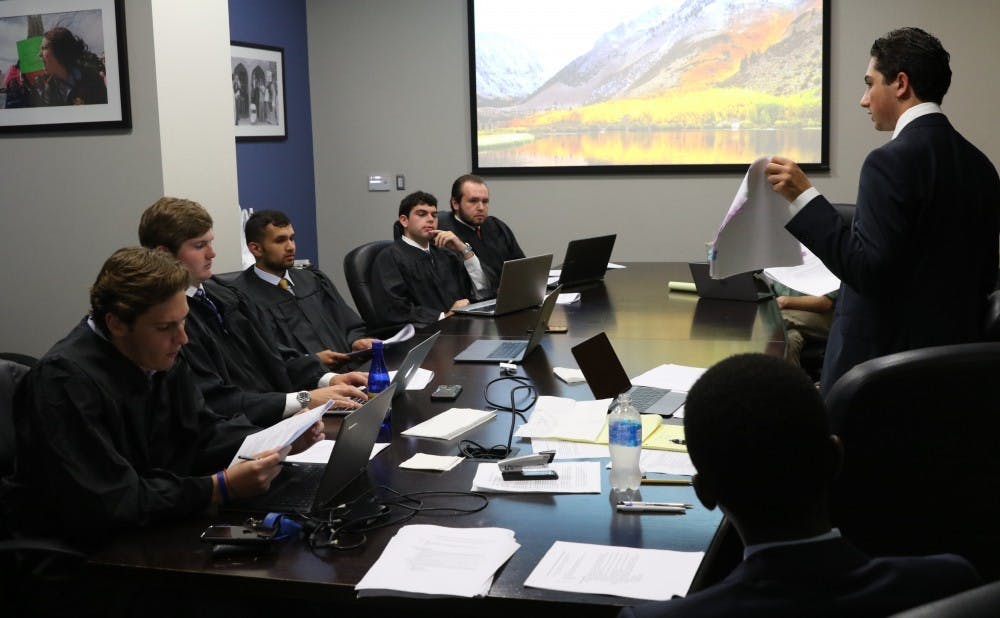The Duke Student Government Judiciary has a new office that aims to ensure that students are aware of their rights and how to access them on campus.
Chief Justice Dev Dabke, a senior, said the Office of Public Advocacy will help protect students' rights on campus—whether they are provided by Duke administrators or incorporated into the Duke Community Standard. Dabke elaborated that the Judiciary wanted to create an access point for advocates—those who are trained in the campus legal system—to better inform all students of their rights. This function is especially important if students do not know whom to contact if they have questions about those rights, he added.
“I want there to be some sort of vehicle for students to have advocates or people who are trained in the bureaucratic legal system on campus and have those people be able to fight for students when it comes to it,” Dabke said. "It’s about finding the appropriate solution for a student's very real problems that they experience on campus."
The evolution of OPA
Dabke said that the Judiciary had a soft launch of OPA last semester. Ranging from advocate recruitment and training to conversations about OPA’s structure, the Judiciary’s efforts were formalized into a hard launch this semester, making OPA now an official part of DSG.
Associate Justice Analese Bridges recalled that the Judiciary had advocates who worked to protect student rights prior to the launch of OPA, but with “not as much of an institutional backing.” Now equipped with institutional support, Bridges, a junior, noted two major changes to the Judiciary.
First, a justice on the Judiciary who oversees the advocates' work. Second, there is going to be a much more concerted effort to reach out to the student body to reinforce OPA’s presence and work on a variety of different issues.
“Before, advocates were working in a capacity of presenting in front of the Judiciary or maybe taking on a singular project or two projects," Bridges said. "Now that we have a team, a lot of things are going to get done.”
Bridges noted that the members of the Judiciary serving in OPA will be responsible for coordinating the advocates' efforts. A principle officer will also assist in selecting new advocates, oversee outreach efforts and serve as a liaison between the OPA and the other offices in the Judiciary.
The principal officer's primary role is assisting in selecting and training new advocates, overseeing marketing, access, and outreach for OPA and also serving as a liaison between the other offices in the Judiciary and OPA.
“We will have our principal adviser of OPA, and we’ll also give them support in terms of resources, if they need clerks to jump in and help with some of their legal research,” Dabke said.
Dabke added that the Judiciary has also reached out to the law school to have law faculty members and students involved, but the relationship has not been fully fleshed out.
Recruiting new members
Bridges said that the official capacity of her role includes being in charge of recruitment and marketing. Although several people are involved in the advocate selection process, she ultimately is the one coordinating and centralizing such efforts.
Bridges said that advocate applicants do not need to have a particular background. Rather, the Judiciary accepts applicants with a wide array of experiences and have manifested themselves in critical thought, engagement and analysis.
"People come from economics backgrounds, math and computer science to sociology to your more traditional political science pursuing a pre-law track," Bridges said. "So, there’s no set experience an advocate should have. We’re hoping we can have a wide array of people apply, get accepted and be a member of the program."
Bridges said she is excited about the pool of applicants the Judiciary has received so far and notes that having potential advocates with wide-ranging backgrounds comes as an asset to OPA. Because student rights claims are so varied, the Judiciary hopes that the diverse experiences of its applicants will enable it to reach out and represent students equally.
Dabke emphasized that he wants OPA to consist of people who are versed in the various bureaucratic and legal procedures on campus.
“I really just want students to know about advocacy," Dabke said. I want them to know that it’s possible for students to—even if they don’t know what their rights are, and they just want to figure out what they are—feel free to contact us."
Get The Chronicle straight to your inbox
Sign up for our weekly newsletter. Cancel at any time.

Stefanie Pousoulides is The Chronicle's Investigations Editor. A senior from Akron, Ohio, Stefanie is double majoring in political science and international comparative studies and serves as a Senior Editor of The Muse Magazine, Duke's feminist magazine. She is also a former co-Editor-in-Chief of The Muse Magazine and a former reporting intern at PolitiFact in Washington, D.C.

